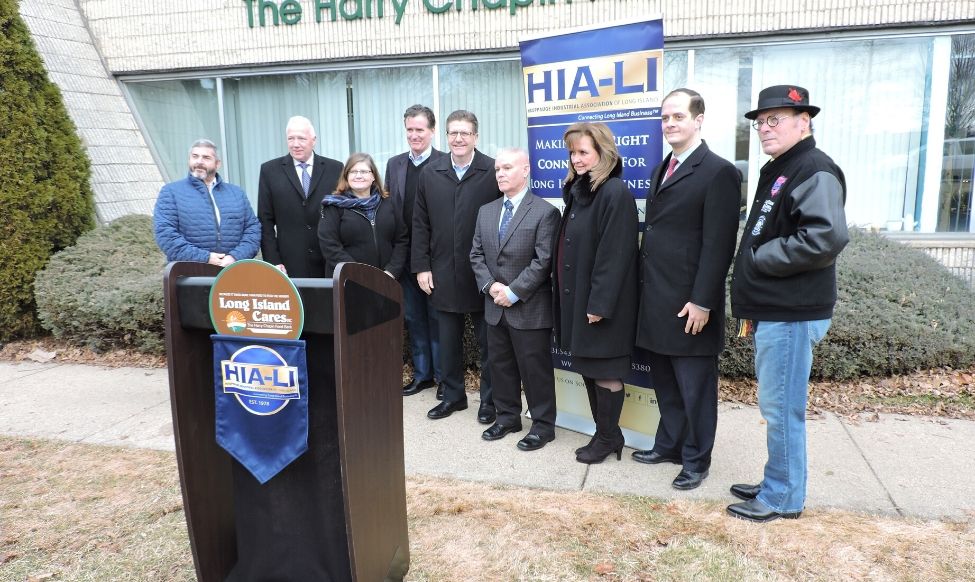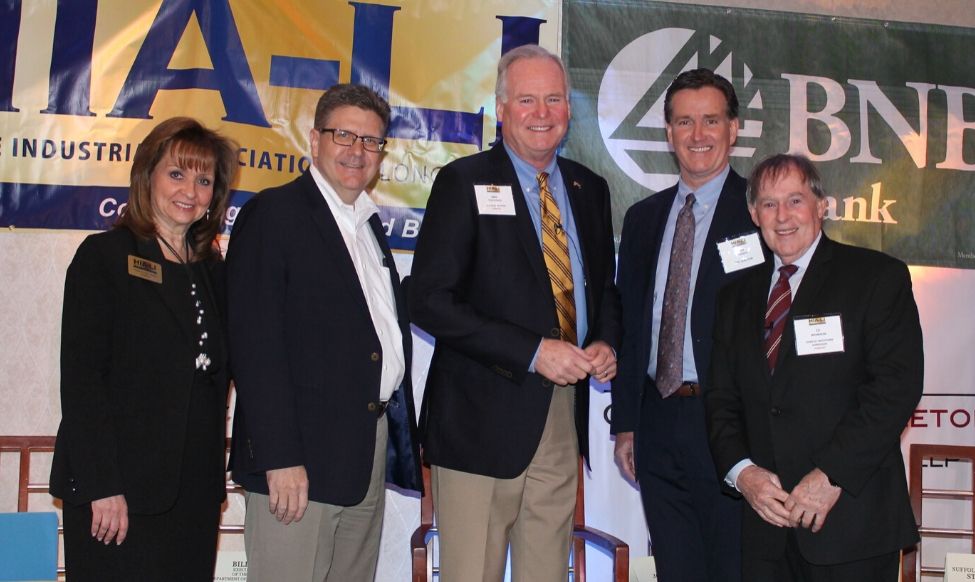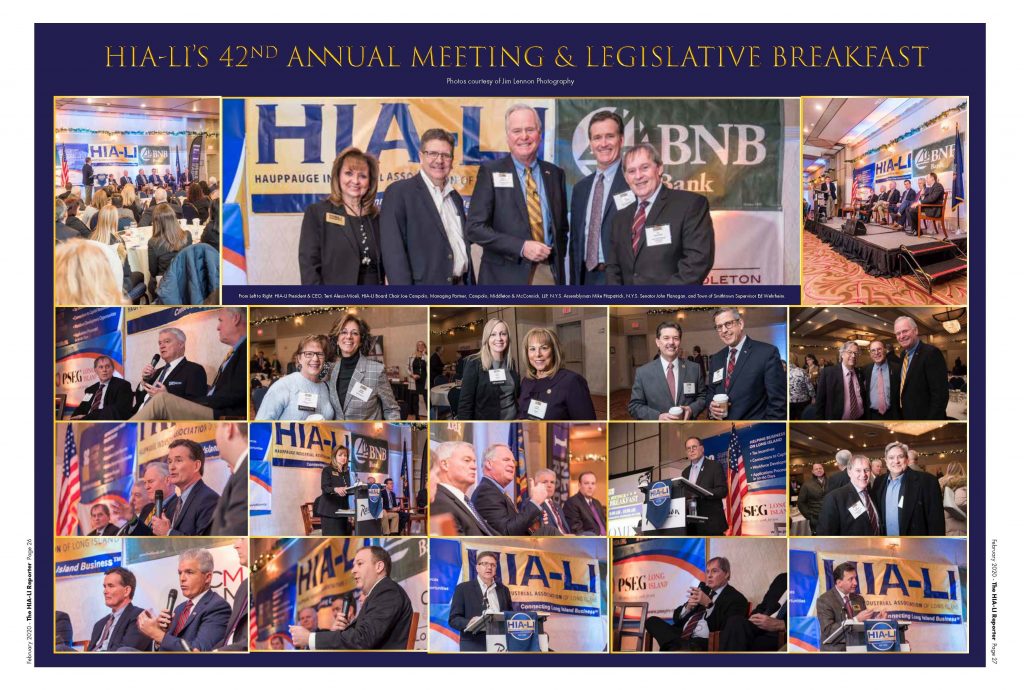HAUPPAUGE, NY – JANUARY 31, 2020: As part of an ambitious solar power initiative unfolding at Long Island’s largest industrial park, Long Island Cares – one of the region’s premiere charitable institutions – has completed the installation of solar panels on the 35,000 square-foot roof of its headquarters at the Long Island Innovation Park at Hauppauge (LI-IPH).
One-hundred percent of the
renewable energy generated on Long Island Cares’ roof at 10 Davids Drive –
amounting to 350,000 kilowatt hours annually – is now ready to be sent offsite
to service the electrical needs of approximately 50 households experiencing
hardship and food insecurity.
Community solar provides renewable energy – particularly solar power – accessible to more people. With community solar, multiple customers can save money on their electric bills thanks to energy credits generated by one, large solar array located elsewhere. The array is managed by a host that enrolls customers and acts as a liaison with PSEG Long Island. PSEG Long Island is responsible for distributing the credits from the host’s account in accordance with the sponsor’s instructions.
The project represents the first major milestone for the HIA-LI Solar Task Force launched by HIA-LI, one of the region’s most-prominent business associations. The task force is led by Co-Chairs Scott Maskin, CEO of SUNation Solar Systems, one of Long Island’s largest installers of solar panels and equipment, and Jack Kulka, President of Kulka, LLC, a major development and construction firm.
“This solar project represents
a direct extension of the humanitarian work of Long Island Cares,” said Paule
Pachter, CEO of Long Island Cares. “A large part of Long Island Cares’ focus is
on providing emergency food relief to hungry and food-insecure Long Islanders
through the Harry Chapin Regional Food Bank. But we also engage in direct
service programs that address the humanitarian human needs of veterans,
seniors, immigrants, and others struggling with economic and social challenges.
“By taking the entire energy
output of our solar installation and sending it offsite to provide discounted
power to homes occupied by our lower-income neighbors, these households will
have new-found income to address some of their immediate needs.”
“Second in size only to
California’s Silicon Valley, the Long Island Innovation Park at Hauppauge is truly
the heartbeat of Long Island’s economy,” said Scott Maskin. “As such, it has a
unique opportunity to bring forward both technology and value in a substantial
way. From an energy perspective, the park can act as a responsible, shining
example for all of Long Island.
“Through the successful
embrace of this program,” Maskin added, “our park can distinguish itself as
Long Island’s single largest energy producer, delivering revenue to its
building owners while helping achieve New York State’s renewable energy goals.
It’s a win-win all around.”
“Energy costs are an
important factor in determining economic competitiveness here on Long Island or
in any region,” said Mr. Kulka. “Fortunately, we now live in an era
where we are finding bolder and more aggressive ways to curtail these
costs, and our task force is actively pursuing new savings through solar power.
“By using the ‘community
solar’ approach, Long Island Cares is also showing us that we can cut energy
spending and be more sustainable, while at the same time act in an inclusive
way. It’s now not only possible to reap savings, but we can also share savings
with others in real need. Solar power can be a community builder.”
“The Long Island Innovation
Park at Hauppauge is not only one of Long Island’s most-powerful economic
resources, but it’s also a source of new ideas and inventive programming that
advance both business growth and sustainability,” said Town of Smithtown
Supervisor Ed Wehrheim. “I expect many businesses and communities on Long
Island to emulate Long Island Cares’ example here.”
“PSEG Long Island supports
renewable power to help make communities more energy efficient and less
dependent on fossil fuels,” said Michael Voltz, Director of Energy Efficiency
and Renewables at PSEG Long Island. “We look forward to assisting additional
communities across our service territory implementing clean energy actions to
save money for their residents.”
“Through the installation of this new community solar project, Long Island Cares reminds us all of the special connection between community and climate,” said Tom Falcone, CEO of the Long Island Power Authority. “Long Island Cares’ solar project provides clean energy to the less fortunate among us – a goal LIPA strongly supports. Congratulations also goes to the HIA-LI Solar Task Force. I look forward to our continued work together to ensure access to clean energy for all Long Island residents.”
“As
we move forward with smart investments in clean energy, I applaud Long Island Cares’ forward-looking community solar
initiative,” said Suffolk County
Executive Steve Bellone. “In order to help other non-profits and
commercial businesses follow in Long Island Cares’ footsteps, Suffolk County
has adopted Open C-PACE, a program which offers below-market
financing for solar and energy efficient investments. We will continue to work
with all of our partners to build a cleaner, greener, Long Island.”
“Long Island Cares deserves
the praise of all Long Islanders for undertaking a solar initiative that
promotes sustainability while also benefiting the community at-large,” said
State Senator John J. Flanagan. “I applaud the HIA-LI Solar Task Force for
their leadership role in advancing a creative program that will reap valuable
benefits for many decades to come.”
The HIA-LI Solar Task Force
offers the opportunity to install solar power on buildings in the PSEG Long
Island territory, with a special focus on roof space situated within the
LI-IPH. The park consists of more than
20 million square feet of unutilized roof space with a solar capacity exceeding
80 megawatts. For context, a megawatt of solar energy can fit on an average
100,000-square-foot building. Each megawatt is able to serve about 125 Long
Island homes.
Capitalizing upon previously
unattainable economies of scale, the initiative allows building owners to take
advantage of the economic benefits of solar energy either through community
solar programs or through traditionally net-metered systems for properties
requiring on-site power. The park is able to reduce electricity consumption,
generate revenue, and play a role in achieving New York State’s aggressive
sustainable energy initiatives. Formed
in 2018, the solar initiative expects to be instrumental in helping the business
park achieve 100-percent-reliance on renewable energy by 2040.
Renewable
energy can provide businesses acting as the community solar host with
lower-cost energy supplied by the panels, or they can contract all or a portion
of the excess energy to “off-takers”. A host
is the project sponsor and is responsible for owning or operating the
generation facility, coordinating the project’s interconnection and operation
with the utility, and supervising and fostering cooperation among the project’s
subscribers. PSEG Long Island energy efficiency
programs help businesses implement energy saving measures to reduce electricity
usage and energy management options.
“The HIA-LI solar program is
exciting and ambitious, and, better yet, there’s no reason why it has to be
such a unique enterprise here on Long Island,” said Terri Alessi-Miceli, President and CEO of HIA-LI. “There are dozens
of building clusters and multi-structure, institutional land parcels of all
kinds across Nassau and Suffolk counties that could follow our example. Long Island
would reap big benefits if other grouped properties used the LI-IPH solar model
as a template for action.”
“While it makes a lot of sense to focus on the cost savings associated with solar power, it’s also important to highlight the contribution that renewable energy makes to sustainability,” said Joe Campolo, Managing Partner of Campolo, Middleton & McCormick, LLP and Chairman of HIA-LI Board of Directors.
“Across
America, emerging generations of executives are ever more deeply tuned in to
the message of environmental stewardship. The HIA-LI solar initiative sends the
right message to tomorrow’s business leaders across America: Long Island is a
place where we unite to build a sustainable future.”
Making this project even more distinct
is the unique collaboration of leading local energy companies including
Edgewise Energy, Entersolar, Harvest Power, Empower Solar, Top Cat Consulting,
H2M Engineering, and Greenstreet Power Partners. Combined, these entities have
designed and deployed hundreds of megawatts of solar power.








